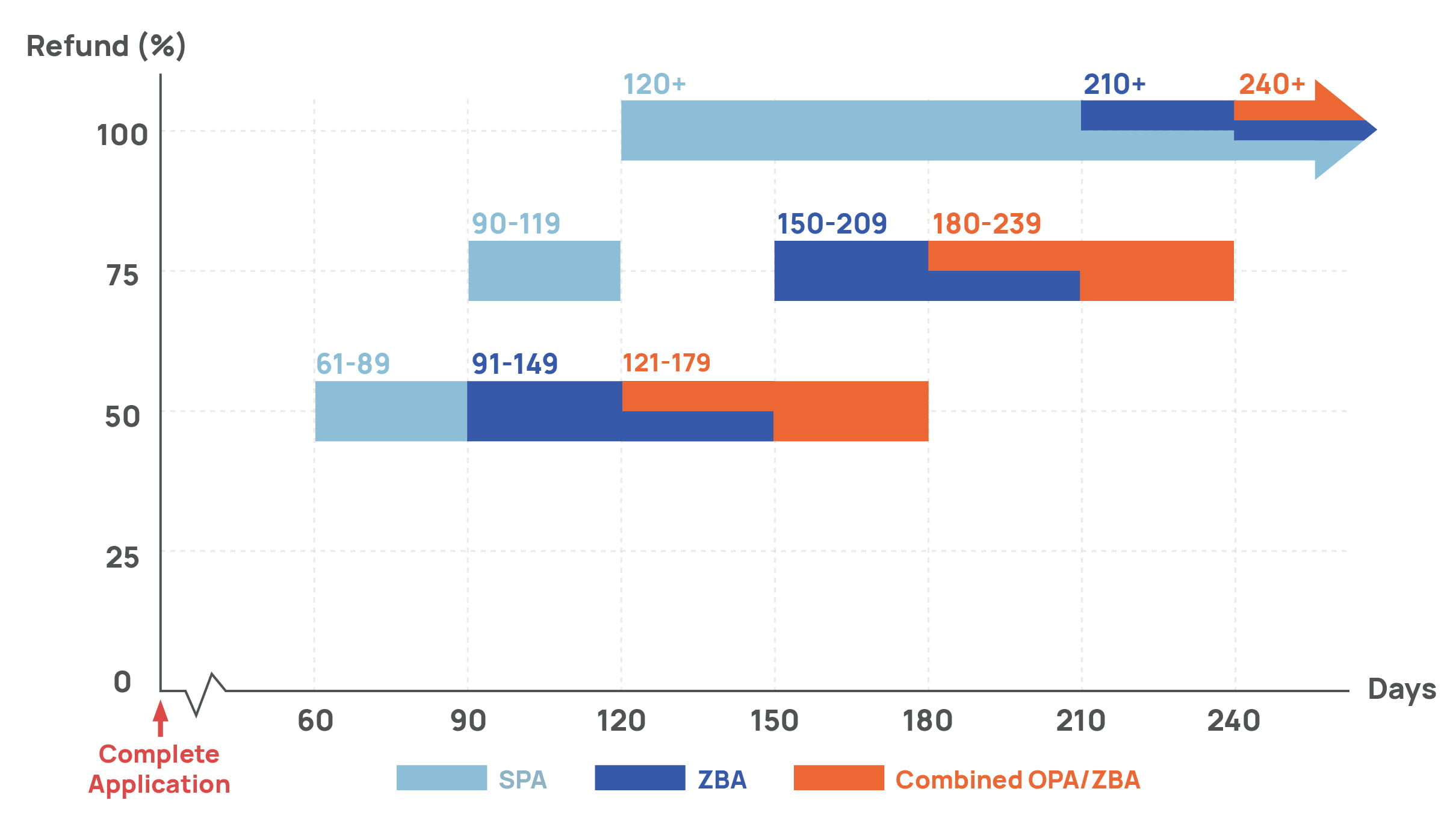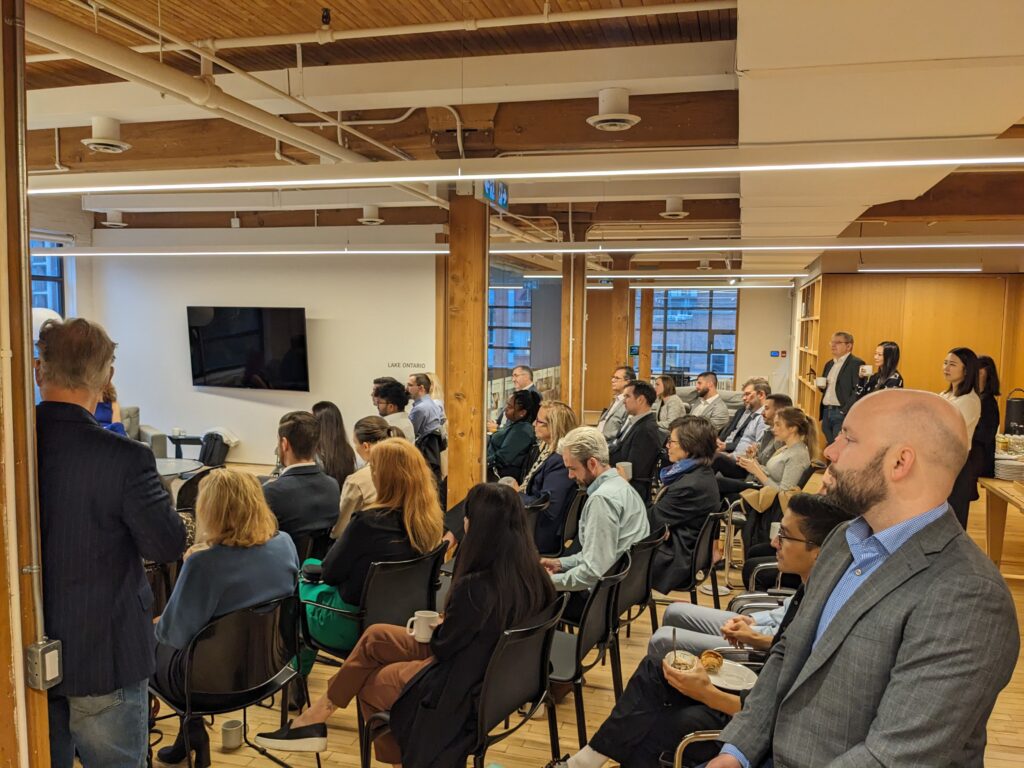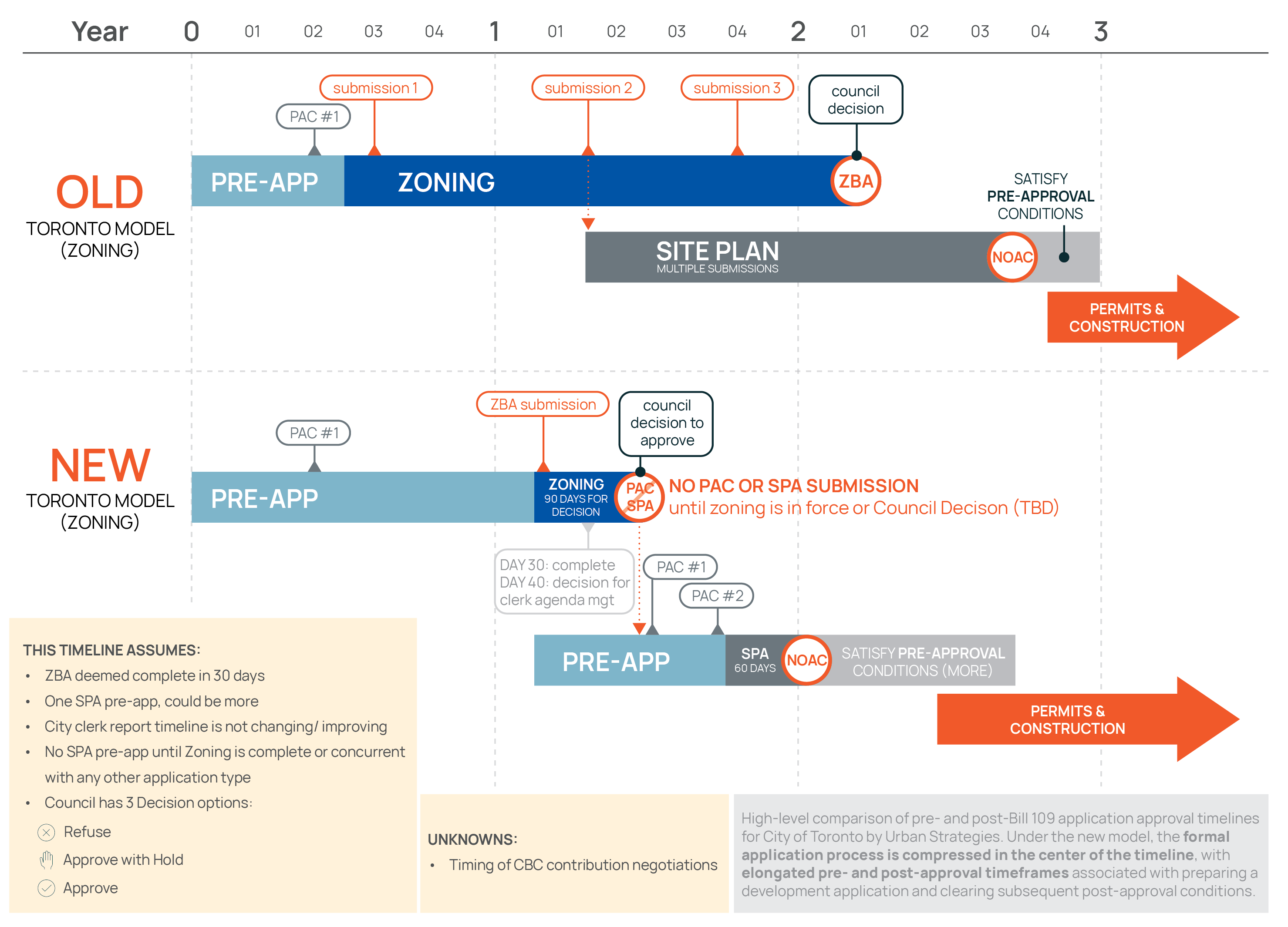
In late 2023, Urban Strategies hosted an intimate series of morning coffee conversations at our Toronto studio, sharing perspectives on how provincial policy changes are impacting the way we plan in Ontario, and how we can collectively chart a path forward through the ongoing sea change.
This forum allowed for sharing ideas and perspectives on the evolving planning approvals process. Panelists included senior municipal planners, policy experts, municipal lawyers, housing experts, and developers. The format was a brief panel discussion followed by an informal and frank dialogue that followed Chatham House Rules (comments not to be attributed to a speaker).
Responding to Bill 109: the Evolving Approvals Process in the GTHA
The first session explored the changes GTHA municipalities are making to the planning approvals process in response to Bill 109, and the resultant impacts on timelines, engagement and design excellence.
The Province of Ontario’s Bill 109, More Homes for Everyone Act, 2022, has turned the process for planning approvals in Ontario on its head, with the objective of facilitating speedier approvals to get shovels in the ground faster for much-needed housing.
But will Bill 109 actually live up to this tall order, or does it create more issues than it purports to fix? This question was on everyone’s mind at Urban Strategies’ first discussion of its three-part Morning Buzz series that aimed to bring together a range of perspectives from the planning and development industry to yield insights into Ontario’s evolving planning approvals process.
In our first discussion, the conversation focused predominantly on the truncated timelines within which municipalities must render decisions on planning applications, the mandatory application fee refunds introduced under Bill 109 that apply when the prescribed timelines are exceeded, and how municipalities are recalibrating their pre-submission consultation and review processes to adapt to the post-Bill 109 world.
New Pre-Application processes
Urban Strategies has been tracking the varying approaches that municipalities across Ontario have taken to adapt to the Province of Ontario’s Bills 23, 97 and 109, among other legislative changes. What these municipalities share is a newfound urgency to frontload much of the application review process in advance of the actual submission of a development application, and thus outside of the formal Planning Act timelines.
The provisions of Bill 109 related to application fee refunds came into effect on July 1, 2023, requiring municipalities to rapidly overhaul their development application review processes to mitigate the risk of having to issue fee refunds if they cannot render decisions on applications within the timeframes prescribed under the Planning Act. These fees are heavily relied on by municipalities to recover the costs of conducting development application review.
Gauging from the perspectives shared at our first Morning Buzz session, in the Bill 109 world, the pre-submission consultation and review process plays a critical role in determining the trajectory of an application after the clock starts on the Planning Act timelines. However, it also represents a potentially lengthy and unstructured phase in the process that has the risk of taking on a life of its own.
What are the key issues/changes everyone in development should know?
Many issues and concerns have been identified, both from municipalities as well as from the development community, around how Bill 109 is impacting the development approvals process.
The key matters raised include the following:
Challenges of compressed timelines
In the Bill 109 world, the statutory clock starts at the date a fee is paid for a complete development application. A decision to approve or deny the application must then be made within the prescribed timeframes, which are outlined in the table below.

Given these highly compressed timelines, much of a municipality’s review and comment on a proposal will now happen in advance of the formal submission. Moreover, discussions around complex issues such as parkland dedication and community benefits contributions will likely need to occur in the pre-application phase and be substantially resolved by the time an application is filed in order to ensure that they can be effectively secured in an approval instrument or related approval conditions. Our panel emphasized that the importance of frontloading discussions and decisions on these crucial matters in advance of the formal submission cannot be understated – if an applicant wishes to have a productive pre-application process, it must provide a robust pre-application package for staff review. The flip side to this, and what our clients are now learning, is that it relies on developers taking on the cost of more detailed work in the early pre-application phases, which may create reluctance to make adjustments following staff comments.
Pre-application purgatory
The lack of clear timelines associated with new mandatory pre-application processes has been a particular concern of the development community, and one that was raised by attendees of the session. Applicants are reluctant to expend significant time and resources honing a proposal in the pre-application period if the outcome is so uncertain, and if municipal staff are not able to meaningfully engage in the face of other active applications with timeline pressures.
While a remedy for moving past the pre-application process is to make a formal submission, if a municipality is not satisfied with a proposal it may refuse to accept the submission as a complete application, or immediately issue a refusal report to hedge against having to issue a fee refund.
Inability to file concurrent applications
It has previously been commonplace for applicants to file concurrent applications for ZBA and SPA (and ZBA and Draft Plan of Subdivision) to achieve efficiency in the application review process. But with the new refund timelines, most municipalities have implemented policy changes to restrict concurrent submissions, as municipalities simply cannot make a decision to approve an SPA application within 60 days where zoning is not already in effect.
Zoning Conformity as a pre-condition to SPA application
City of Toronto Council recently adopted the proposed Official Plan Amendment 688 to establish zoning conformity as a pre-condition for an SPA application. Other municipalities are following suit. These new requirements, once fully implemented, will be a significant change, with some unintended consequences that still need to be worked through including, for example, the intersection of minor variance applications with Site Plan Approval. SPA approval timelines seem to create a de facto requirement for any minor variances to be approved prior to SPA submission or, at the very least, determination of a complete SPA application.

Increased use of H provisions
Another way in which municipalities are adapting to the Bill 109 world is by increasingly applying holding (H) provisions to rezoning approvals. Our Morning Buzz series panelists opined that the use of H provisions is likely to be more prevalent to secure various matters in conjunction with a rezoning approval. Although staff in several municipalities now have delegated authority to lift an H provision, there is concern that H provisions could result in onerous post-approval conditions with no timeline for staff to work with an applicant to lift the hold, and negating any perceived time-savings from the legislated approval timelines. Furthermore, zoning is not in effect on a property if a Holding Symbol remains on the property.
SPA submission and approval
Similarly for SPA applications, staff may expand the scope of matters to be addressed through NOAC with a greater range of pre-approval Notice of Approval Conditions (NOAC) for Site Plan Approval (conditions that need to be met before Building Permits can be issued). This is significant given that SPA serves as an important trigger for a variety of concurrent steps attached with other processes, such as locking in development charges, determining an applicable Toronto Green Standard regime, or transition provisions for Inclusionary Zoning.
Debating process vs. Quality, design and merit
Bill 109 has placed elevated importance on determining the completeness of an application, requiring municipalities to scrutinize the materials filed in support of a development application for alignment with applicable terms of reference, in order to ensure that the municipality has the full scope of information required to render a decision within the prescribed timeframes.
From the perspective of some in the development community, this has led to increased time spent debating with municipal staff around process issues (e.g. technical application completeness) instead of on the quality and merit of a particular proposal. According to our panel, this had led to a large increase in OLT motions being brought by applicants seeking declaratory relief for matters such as complete application determination, in order to overcome impasses. Typical processes related to design matters, like Design Review Panels, will also be front loaded as there is no longer time for commenting on design post-submission. Though this already did occur in Mississauga, and sometimes in Toronto.
Frontloaded community consultation
In the Bill 109 timeframes, there is often simply not enough time to hold community consultation and incorporate feedback obtained through such consultation as part of the formal application review and decision-making process. As a result, community consultation is in many instances now taking place during the pre-submission phase. We heard from our panel that this is a particular issue for councillors who are accustomed to more points of interface in the application review process, especially in the public forum.
What happens next?
We return to the original intent of the suite of recent Provincial legislative changes – to get more homes built faster.
Bill 109 is supposed to accelerate planning approvals so that housing can be built faster. But will it have the intended effect? We heard from our panel and those in attendance that Bill 109 has created significant challenges around where, when and how resources are expended into the development application approvals process, both on the part of municipalities and of applicants.
We also heard concerns that a major unintended consequence of Bill 109 is that matters previously addressed through the formal review process have now been relegated to the pre-application process and to post-approval condition clearance, both being processes that do not have mandatory timelines associated with them and that, in some cases, could have the potential to prolong the overall approval process beyond pre-Bill 109 timelines, or at least match them (see figure below). In this sense, Bill 109 begets new problems that require additional solutions.
Our panel was not unequivocally critical of Bill 109, pointing out that there are elements of the ensuing disruption that are beneficial to help alleviate key pain points in the approvals process – like improvements to Toronto’s PAC process. The panel also pointed out that some of Bill 109’s fundamental issues could be fixed with simple legislative reforms, such as allowing applicants to agree to waive fee refunds to relieve the pressure on the municipality. While a 60-day SPA approval for a small building in a municipality with limited development activity may be possible, 60 days to review and approve complex tall building proposals in Toronto and Mississauga is a near-impossible proposition.
For now, Bill 109 is the law of the land, and we will all have to learn to live with it, for better or for worse. When the dust settles, it will become more apparent how well this new regime is working and whether it relieves, or exacerbates, pre-Bill 109 issues with the approvals process.
Any Faster? Comparison of Zoning Approval Timelines

Check out our other Morning Buzz Sessions: